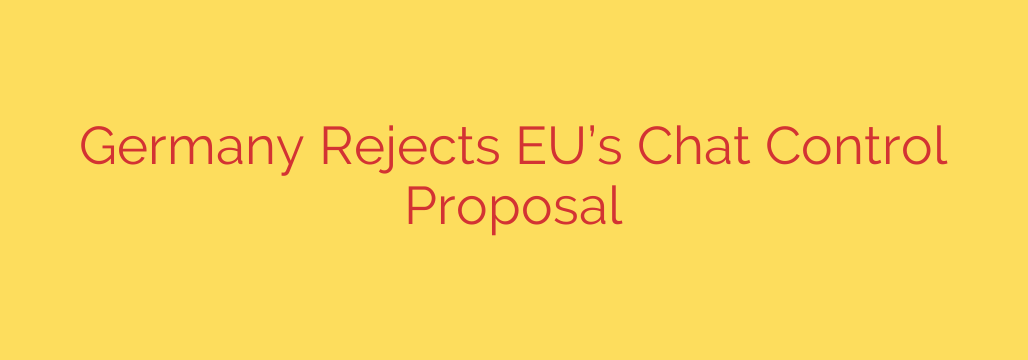
Privacy Under Threat: Germany Rejects Controversial EU ‘Chat Control’ Plan
In a significant move for digital rights across Europe, Germany has formally rejected the latest version of the European Union’s controversial “Chat Control” proposal. This regulation, aimed at combating child sexual abuse material (CSAM), has sparked intense debate over its profound implications for privacy and secure communication for all citizens.
The German government’s firm opposition highlights a growing divide among EU member states on how to balance child protection with the fundamental right to digital privacy.
What is the EU’s ‘Chat Control’ Proposal?
At its core, the proposed regulation aims to require providers of messaging services—like WhatsApp, Signal, and Messenger—to scan all user communications for CSAM. The latest version of the plan introduces a concept called “upload moderation,” a term for a process that many security experts argue is functionally identical to the widely criticized client-side scanning.
This technology would involve scanning photos, videos, and possibly even links on a user’s device before they are encrypted and sent. While the goal of protecting children is universally supported, the method proposed has been labeled by critics as a tool for unprecedented mass surveillance.
The Core of the Conflict: Breaking End-to-End Encryption
The central issue is the proposal’s impact on end-to-end encryption (E2EE). E2EE is the gold standard for digital privacy, ensuring that only the sender and the intended recipient can read a message. It protects everything from personal conversations and business secrets to sensitive communications by journalists and activists.
Implementing client-side scanning would fundamentally undermine this security model. Here’s why Germany and other privacy advocates are concerned:
- A Breach of Digital Secrecy: Scanning content on a user’s device effectively creates a backdoor into encrypted communications. It is the digital equivalent of forcing a postal worker to open and read every letter before it’s placed in a sealed envelope.
- A Tool for Mass Surveillance: Security experts warn that creating an infrastructure to scan everyone’s private messages sets a dangerous precedent. Once built, this technology could easily be repurposed to scan for other types of content, such as political dissent, copyrighted material, or anything a government deems undesirable.
- Inevitable Errors and False Positives: Automated scanning systems are not perfect. They can and do make mistakes, potentially flagging innocent family photos or private images as suspicious. Such errors could lead to devastating and unwarranted investigations into the lives of law-abiding citizens.
Germany’s position, articulated by its officials, is that any measure that weakens or bypasses secure encryption is unacceptable. The German government has stated that protecting confidential communication is non-negotiable, as it forms the bedrock of a free and democratic society.
The ‘Slippery Slope’ and Broader Implications
Civil rights organizations and tech experts have long warned of the “slippery slope” that Chat Control represents. They argue that if the EU mandates the scanning of private messages for one purpose, it opens a Pandora’s box for future surveillance demands.
The technology required for this scanning would need to be installed on billions of devices, creating a powerful and centralized monitoring system. This system would be a prime target for hackers and authoritarian regimes seeking to spy on individuals. The proposal is seen not just as a threat to privacy, but as a significant cybersecurity risk.
Practical Steps to Safeguard Your Digital Privacy
As this debate continues, it serves as a critical reminder of the importance of protecting your own digital communications. Here are a few actionable steps you can take:
- Choose End-to-End Encrypted Services: Prioritize messaging apps that use E2EE by default, such as Signal or WhatsApp. Understand the privacy settings of the platforms you use.
- Stay Informed: Keep up to date with legislative proposals like Chat Control. Digital rights organizations like the Electronic Frontier Foundation (EFF) provide excellent resources and updates.
- Use Strong Security Practices: Employ strong, unique passwords for all your accounts and enable two-factor authentication (2FA) wherever possible. This helps protect your accounts from unauthorized access.
- Advocate for Privacy: Support political representatives and organizations that champion strong encryption and digital privacy rights.
The future of digital privacy in Europe hangs in the balance. Germany’s decisive stance against Chat Control is a crucial defense of secure communication, but the legislative battle is far from over. The outcome will determine whether the digital spaces where we live and work remain private or become subject to pervasive, automated surveillance.
Source: https://go.theregister.com/feed/www.theregister.com/2025/10/08/germany_chat_control_opposition/








